Is the Jersey cow about to come of age in Northern Ireland?
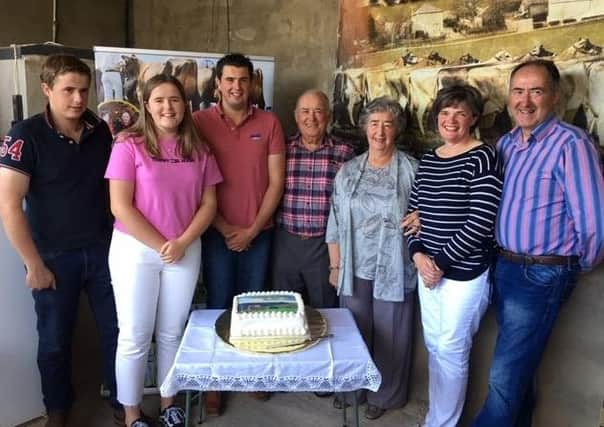

“As far as I am concerned, the change couldn’t come fast enough,” confirmed Seaforde Jersey breeder Ashley Fleming.
“We currently supply Lakeland Dairies. The reality is that were I to be farming in Co Monaghan, instead of Co Down, I would have received an additional €30,000 for my milk last year.
Advertisement
Advertisement
“This is real money. The difference is solely accounted for in the alternative ways that milk is paid for: North and South.
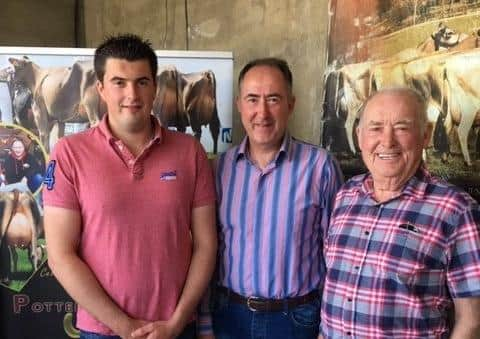

“In the Republic of Ireland they use the A+B-C system, where milk volumes are penalised relative to butterfat and protein levels.
“The processors in Northern Ireland are moving towards a more components-based payment system.
“As far as I am aware the pricing systems that the processors here are looking at will not be an exact replica of A+B-C. But, in my opinion, any producer payment system that takes greater account of milk constituents is to be welcomed.”
Advertisement
Advertisement
Ashley’s comments coincide with two major landmark events for the family’s renowned Potterswalls’ herd.
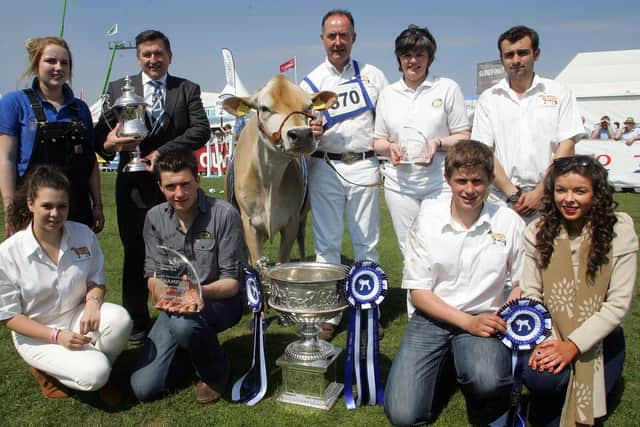

The first of these is the confirmation of the first cow in the herd to produce 100t of milk in her lifetime: the second was the recent celebrations to mark the 50th anniversary of the herd’s establishment.
“It’s been a tremendous 12 months for everyone involved with the farm and the cows,” said Ashley.
“My father Kensy bought the first Potterswalls’ Jersey cow in 1970 at the dispersal of the Camus House herd owned by the King family, who farmed near Coleraine. The cow was called Coleraine Royal Verity. She had her first heifer calf in 1972. And so the journey began!
Advertisement
Advertisement
“It was then a case of building up numbers over the years. Today we are milking 120 cows: there is a total of 220 cattle in the herd. The cows are currently averaging 7,600L at 5.6% butterfat and 3.9% protein.
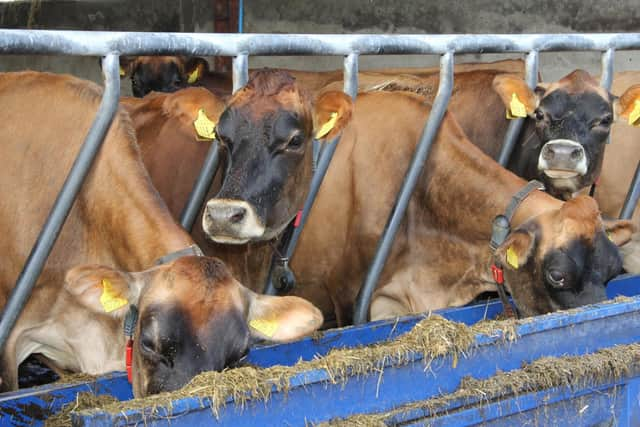

“Last year followed on from a very busy 2019, which saw us invest in two milking robots and an updated housing system to make this work.”
Ashley is among a fast growing group of dairy farmers, both here and further afield, who will quickly confirm the versatility of Jersey cows and their suitability to perform well within any modern milk production system.
These include the animals’ unique ability to produce extremely high quality milk while making best use of forage. Exemplary health attributes constitute another, more than valuable, attribute of the Jersey breed.
Advertisement
Advertisement
“The improvements achieved within the breed over the past four decades are more than significant,” Ashley explained.
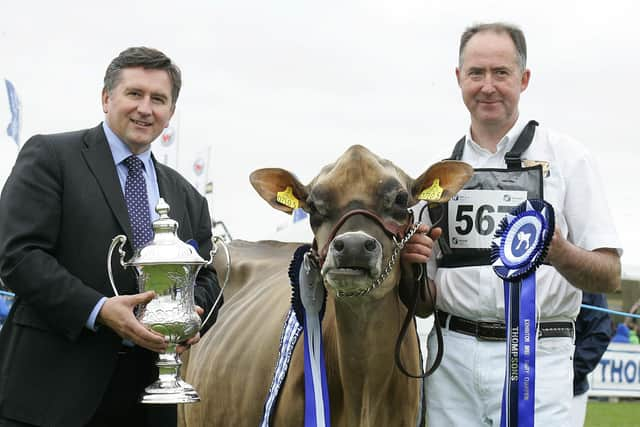

“I remember competing in the Production Class at the Royal Dublin Society Spring Show with my father around 30 years ago. We took the winning rosette with a young cow producing around 4,500L of milk.
“Today we have cows producing double that volume per lactation. However, the solids’ percentage remains the same.
“This is the clearest example that I can give at a personal level of the progress made in breeding Jersey cows that can perform at the highest level within all dairying scenarios.”
Advertisement
Advertisement
So much for the background! Earlier this week Farming Life’s Richard Halleron got chatting to Ashley about Potterswalls’ Jerseys; the history of the herd and what the future may well hold for the business.
He started the conversation by asking a very fundamental question: why was Potterswalls selected as the name for the herd in the first instance? Ashley explained:“As a family, we come from the townland of Potterswalls, which is located between Antrim and Kells. I was born there. My father bought our first jersey cow in 1970. It was kept as a house cow, which was very much the tradition at that time.
“My father lived at Potterswalls and was a mechanic to trade. My grandfather was farm manager at Holywell Hospital Estate near Antrim.”
In 1980 the Fleming family moved to Katesbridge in Co Down and, subsequently, to Seaforde – where they farm today.
Advertisement
Advertisement
“Dairying was always the main driver for the business,” Ashley commented.
“For many years the Jerseys vied for dominance with Black and Whites within the herd. At one stage we had a two sided milking parlour: one with stalls that suited the Jerseys and the other which suited the Holsteins.
“But, gradually, the Jerseys won out. By the time we got to Seaforde, the main driver for the business was the development of a high performing Jersey breeding stock.
“At a personal level I have always had a strong emotional attachment to Jersey cows. However, I also realised that the scope to improve the performance of the cows is significant. And this has proven to be the case.”
Advertisement
Advertisement
Ashley farms with his wife Lynda, sons Lindsay and Lyndon plus daughter Ailsa. His father Kensy has now retired. However both he and Ashley’s mother Hilda are also available to help out, when required.
“It really is a family business,” Ashley stressed.
“Everyone is involved. The investment in the robots is testimony to our commitment to the future of the farm.
“We are maxed out in terms of the numbers of stock we can carry. But we believe there are significant performance gains that we can still achieve from the cows.
“Securing an average yield of 8,000L across the farm, while still maintaining the same level of components is a more than achievable objective, given the progress that we have made over recent years.”
Advertisement
Advertisement
While Ashley will modestly refer to showing Potterswalls’ cattle as being very much a hobby, there’s no doubting the tremendous record of elite victories the Flemings have notched up in the show ring over the years.
This includes 12 Balmoral inter-breed titles, one Royal Ulster Winter Fair inter breed championship plus numerous Jersey breed titles at the likes of the Royal Show, the Highland Show and Dairy Scot.
Forays in the direction of mainland Europe have also proven to be lucrative opportunities for the Potterswalls’ team.
So what have been the challenges that presented themselves over the past 50 years? Ashley explained: “At the start it was a personal challenge and a driving ambition to succeed and do well. I remember competing in inter breed competitions where traditional Friesian judges walked past the Jersey in the ring and never even stopped to look at her, while bystanders sniggered at the pretty little Jersey.
Advertisement
Advertisement
“Now she is a force to be reckoned with. A different type of challenge confronted us when we started to be successful. We purchased Mooncrest Imperial Lady from Canada. Subsequently, we got the cow body clipped to show her off on her first outing.
“After she won the inter breed everyone was talking about this huge Jersey cow. Within a few days I received a disciplinary letter from the Jersey Society threatening me with expulsion for defacing the Jersey cow and bringing the breed into disrepute.
“That letter is framed on the farm office wall: lest we forget.”
Ashley continued:“When we took Imperial Lady to the Royal show in 1999/2000 at 56” tall she stood about 10” above anything else in the Jersey lines. There was a continuous flow of people to see her from the other breeds. The other Jersey exhibitors complained to little avail, so they blocked the aisles forcing us to go through the beef building to the milking parlour.
Advertisement
Advertisement
“While clipping is now a widespread practice, unfortunately, not everyone embraces change. Twenty years after the Imperial lady incident, Lindsay got lambasted on Facebook by Jersey breeders for the way he had presented our All Britain Calf Show Champion Deja Vu!
“I personally met with huge challenges while as Society Chairman I tried to implement change. The then President Roger Derryman told me that I could not expect to make change and remain popular. I guess there will always be a challenge and a resistance to change. It hasn’t managed to stop me yet and I would be pretty confident it has less chance of stopping Lindsay achieving his goals.”
Ashley reflected on the landmark developments that have taken place to make the Potterswalls’ herd such a driving force within the world of dairy breeding. He said:“The herd’s development has involved time and money. The time element has been an unnoticed gradual process which has evolved as the years have passed. It was to some extent a labour of love. Time spent talking to someone at a show, on the phone or off farm can never be quantified.
“I remember speaking to a man and his son at the Winter Fair. They came to the farm and I had pulled out six cows for them to look at, thinking they were interested in one or two. But when the cattle came out of the shed, they decided to take all six.
Advertisement
Advertisement
“The financial investment has been huge. We have bought numerous cows over the years, from Canada - Lady, Magic and Glamour; from Jersey - the Starlights and the Daisybelles and from the UK - Music, Tracy and Indigo.
“We were the first to form a syndicate to purchase Vindication Harp. Our latest investment at Potterswalls Jerseys has been Starry Fizz, a direct descendant of Veronica.
“We have never held back to purchase an individual which we feel will add something to the herd.
“The marketing has changed over the generations. In the early days it was being out and about and being seen. Advertising has helped, but the most mileage has come from the big wins and the press and editorial spin off from these. The show wins have kept our name out there and this has helped with the commercial stock sales.
Advertisement
Advertisement
“In the future social media will be the main channel. Lindsay looks after this with the Potterswalls’ Facebook page. The number of stock sales generated in this way has been amazing.”
Given Ashley’s close ties with the Cogent cattle breeding business, Richard then posed what many would consider the very obvious question: is technology the future? Ashley replied:
“Working in the industry I have seen, at first hand, the benefit of using AI bulls and we embraced sexed semen at the first opportunity.
“Today all breeding females get the opportunity of two straws of sexed semen, a third service will be to conventional and if not pregnant at that point the genomically tested stock bull will be used.
Advertisement
Advertisement
“All females are also genomically tested to provide additional information to help make informed breeding decisions. Genomics are the way forward: how individual farmers use this technology is up to them.”
Richard wrapped up the conversation by asking Ashley to reflect on his favourite cows.
“Potterswalls Tricia, born in 1972, was the cow that really started it all for us. The first love is always special. Our first big hitter had to be Potterswalls Dawn, three times Royal Dublin and Royal Ulster Breed Champion. She was retired in 1987 after becoming the first Jersey cow to take the dairy inter breed at the Royal Ulster.
“I must mention Potterswalls Starlight X-Ray, the breed’s first 89 point two year old and the first EX second calver. But Mooncrest Imperial Lady was the cow that put us on the map in 1999 and 2000 with her widespread acceptance outside of the Jersey breed.
Advertisement
Advertisement
“Potterswalls Glams Elisha was probably the most correct cow we have ever bred while Potterswalls Action Daisybelle was one of the most impressive individuals to bring out.
“Potterswalls Paramount Glamour has been one of the best breeding cows to date with Potterswalls Juno Glamour 2 ET, Potterswalls Starlight Clarissa, Huronia Rene Magic, Starlight Royal Dove and Potterswalls Valentino Starlight all holding special memories for different reasons.
“The herd currently has many exciting milking two year olds to develop. This year we have our first two year old projected to 10500Kgs and two others over 9000kgs, yields we thought years ago couldn’t be achieved by cows never mind heifers.
“The calf shed is also full of interesting young stock. We will continue to develop the herd and add new blood lines from around the world to see what we can achieve and how far we can take the Jersey cow in the future.”